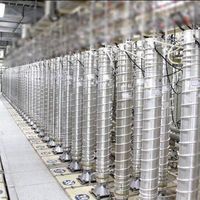Another Politician In Iran Calls For Direct Talks, ‘Ceasefire’ With US
A former senior Iranian lawmaker, Heshmatollah Falahatpisheh, has joined other prominent figures calling for direct talks with Washington and a "ceasefire".
Falahatpisheh, the former chair of parliament's national security and foreign policy committee, told the Iranian Labour News Agency (ILNA), that although it appears a nuclear agreement is within reach, still Iran and the United States need “a cease-fire” whereby Iran stops any nuclear activity beyond what was agreed in the 2015 deal (JCPOA) and accepts a series of inspections. The United States would release Iran's frozen assets and loosen sanctions on Iran's oil export.
In the past few weeks several top politicians as well as business leaders have called for direct talks with Washington.
Falahatpiseh added that the idea espoused by diplomats that "Nothing is agreed until everything is agreed," imposes hardships on the Iranian people by prolonging US sanctions and is far from the standards of diplomacy. Sticking to this rule will prolong the negotiations and the side which is under sanctions will have to pay a higher cost.
He added that based on information by Western news agencies such as Reuters, and the information given away by Russian negotiator Mikhail Ulyanov, the two sides are headed toward an interim agreement. Such an agreement means that every 90 or 120 days the US president should present a report on Iran's commitment to the deal to maintain the suspension of sanctions. This will continue until a final agreement is made.
"The time wasted in the meantime means losses for both Iran and the United States. Besides, as Tehran has refused to negotiate directly with Washington, the other parties to the JCPOA have defined spheres of interests for themselves," said Falahatpisheh, while the main protagonists are the United States and Iran.
Falahatpisheh explained that Tehran’s problem is that for a long time it has insisted that accommodation with the United States is bad and now it is finding it difficult to convince the nation and even its own supporters that it is moving in the right direction. At the same time, Biden needs to thread carefully not to antagonize the US Congress. All this makes an agreement an arduous and drawn-out process.
This comes while Iran and the United States need to reach to an agreement as soon as possible. Iran particularly needs this to start economic dealings with the rest of the world. At the same time, the world's priority now is the Ukraine crisis.
Another complicating factor is Iran’s insistence that all secondary and non-nuclear sanctions be lifted because these could still adversely affect Iran's economy.
Meanwhile, in interview with reformist Ensaf News website, US-based Iranian political commentator Dariush Sajadi, who usually supports the position of Iran's hardliners, also said that although individuals on both sides ae hopeful about an imminent agreement in Vienna, it is unlikely that the negotiations would lead to a tangible result. Sajadi added that he believes neither Iran, nor the United Stats are really after the revival of the JCPOA.
In America only the democrats are interested in the matter, but they have a fragile situation in the Congress and fear that giving concessions to Iran will be harmful to their narrow majority. He added that although the US side insists that time is running out for an agreement, they do not mind if the negotiations drag beyond the Congressional elections in November.
In Iran, however, Sajadi said, the harsh economic impact of the sanctions has made the people anxious to see results as soon as possible. "If it were not for the pressure of the sanctions, Iran would have never agreed to take part in the negotiations," he added.
Asked how, in his opinion, an agreement will be made between Iran and America, Sajadi said: "I believe they will not reach an agreement."







